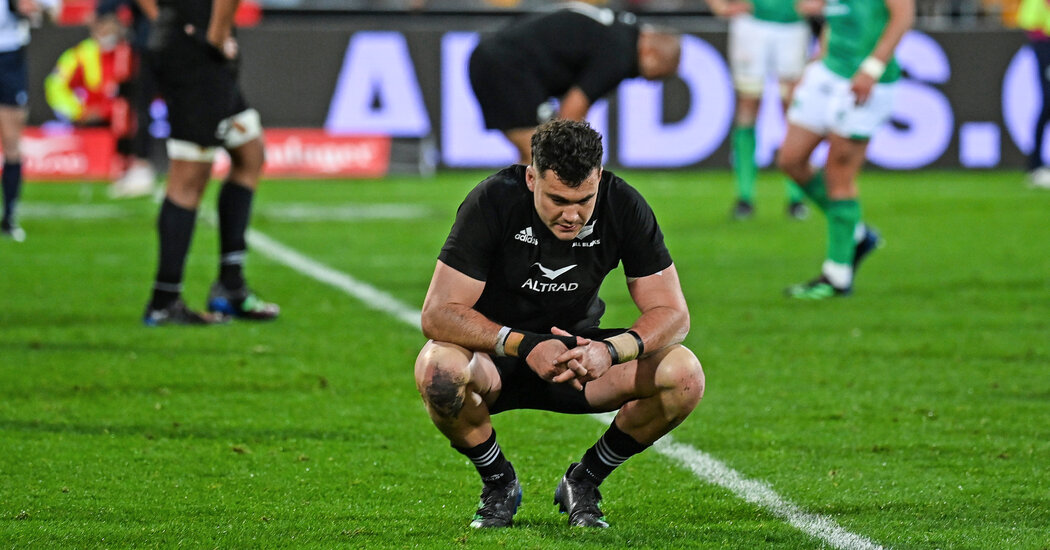Rugby’s Greatest Team Confronts a Worrisome Prospect: Decline

AUCKLAND, New Zealand — When New Zealand’s All Blacks face South Africa on Saturday in the opening match of the annual four-nation Rugby Championship, it will be one of the few times in their decorated history that they have played as underdogs.
For 119 years, the All Blacks have dominated men’s rugby union. Three World Cup titles. An all-time winning percentage of nearly 80 percent. No country on earth has a winning record against them. Only seven national teams, in fact, have ever beaten them.
Yet after a series of defeats led to a humbling drop in the world rankings, the team — and New Zealand — is facing a prospect that once seemed unthinkable: The All Blacks are in decline, and this time they might not have what it takes to bounce back.
The All Blacks have lost four of their last five matches, most recently last month, when Ireland defeated them twice to deliver New Zealand’s first home series defeat since 1994. The All Blacks have slid to fourth in the world rankings, their lowest position ever.
The struggles have called into question the team’s myth of invincibility — “In the worst case scenario, this is the beginning of the end of the All Blacks’ dominance,” said Dylan Cleaver, a veteran sports journalist — and left New Zealand asking not only why its most iconic representatives have faltered, but also what it means when the world’s greatest rugby team isn’t actually the best.
For most of New Zealand’s modern history, rugby was a national project. “Every small town could boast a rugby club. Some boasted two,” said Scotty Stevenson, a rugby commentator and analyst for Sky Sports. “That’s what boys in this country largely did.” The greatest aspiration of most of them was to be an All Black.
That tradition, and the team’s decades of dominance, created a “production line of talent” that other, larger countries couldn’t match, Cleaver said. The pipeline ran through high schools to local clubs and provincial teams, offering the All Blacks a wealth of experienced talent from which to draw. As a result, Cleaver said, the All Blacks at times considered themselves “transition-proof,” able to “plug in and play” new players without enduring the kind of rebuilding periods that sporadically hit other national teams.
But New Zealand has changed. While rugby still fascinates many, the number of men who play the game is dropping as interest in other sports grows. (Women’s rugby, by contrast, is growing fast.) In 2018, for example, the number of young people playing basketball for their school overtook the number playing rugby for the first time, according to School Sport New Zealand, which coordinates high school sports in the country. A separate government agency charged with promoting sports, Sport New Zealand, found in 2021 that only 7 percent of young New Zealanders regularly play rugby.
And for these remaining players, the modern school-level competition is dominated by a handful of elite schools that have positioned themselves as the only pathway to a professional career. Unable to compete, the rugby programs at many other schools have been neglected, or shut down. Some see that narrowing feeder system as the root of the problem.
Prestigious Super Rugby teams also often select players directly from that small group of elite high schools, skipping the club-level rugby that once built players’ resilience and exposed them to diverse playing styles. Instead, critics said, players today are groomed and developed to fit into what has become a hyper-professionalized model preferred by a small subset of teams.
“When you design your system to circumvent the natural progression that has worked for New Zealand for so many years, that is going to have consequences,” Stevenson said.
In the same way, the All Blacks’ centrality to New Zealand rugby also may have backfired. According to Cleaver the single-minded focus on producing players who fit one team “generated homogeneity throughout the entire system.” Unable to test themselves regularly against different playing styles, he said, top players lost flexibility and resilience. “Because we play the game the same throughout the country, we’re not very good at adjusting on the fly,” Cleaver said.
These struggles were most obvious in mid-July, when the team lost to Ireland in the third match of a home series. Even then, there was magic in the stadium — proof that the All Blacks are still, according to Cleaver, “the most talented group of players in the world when they have the ball.”
At one point, Akira Ioane — who attended the elite Auckland Grammar School and graduated almost immediately into the Blues Super Rugby team — danced through Irish jerseys, one opponent after another grasping at air as the 6-foot-4-inch flanker bounced off one player, slipped through two others and feinted past a fourth to score a memorable try.
But other potential attacks were smothered by Ireland, which through unstinting pressure and discipline denied the All Blacks the option of relying on talent alone.
That tendency has been visible since the 2019 World Cup, when the All Blacks, who had won the tournament in 2011 and 2015, failed to make the final. But when the longtime head coach Steve Hansen departed, New Zealand Rugby, the sport’s national governing body, appointed his top assistant, Ian Foster, as his replacement instead of prominent external candidates.
Cleaver said the hire showed an unwillingness to admit that the All Blacks’ leadership and culture was flawed. “To throw away the coaching team, you’re saying the culture that has sold a million jerseys and books is overblown,” he said.
Following their more recent failures against Ireland, however, Foster and New Zealand Rugby have made concessions. While Foster survived calls that he should lose his job, several assistant coaches were replaced, and deeper changes remain possible. Foster’s contract runs through next year’s World Cup in France, but a new run of defeats would most likely make his position untenable, Cleaver said. The same is true for underperforming players, creating a rare moment of vulnerability for the “transition-proof” team.
But any substitutions on the All Blacks will do little to resolve wider issues of declining participation and growing elitism, Cleaver and Stevenson said. And while the sport may no longer be a national project, it remains a national obsession.
“They are the most lauded and respected rugby team in the world,” Stevenson said. “But with that comes intense pressure to sustain a level of success that probably no other professional sporting teams are expected to sustain.”
And if those expectations are not met, Foster acknowledged recently, New Zealanders will demand accountability.
“We’re desperate to perform against South Africa,” he told assembled news media. “There’s a lot riding on it.”





